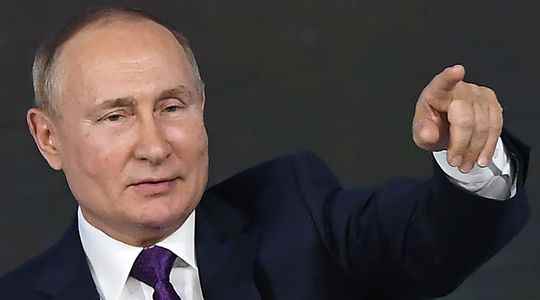The Old Continent is attacking the wallets of Russian elites. The Europeans decided on Friday to sanction Russian President Vladimir Putin and his Foreign Minister Sergei Lavrov by freezing their assets in the EU. “This is an important step. The only leaders in the world sanctioned by the EU are Syrian President Bashar al-Assad and President of Belarus Alexander Lukashenko, and therefore now Vladimir Putin for Russia,” said Josep Borrell , Vice-President of the European Commission, during a press conference. The European sanctions will concern “the most senior leaders” Russian, said Friday Emmanuel Macron. These measures respond to Ukrainian President Volodymyr Zelensky’s call to strengthen European sanctions against Russia to punish it for its invasion of Ukraine.
In order to measure the effectiveness of this measure, it is necessary to understand what the fortune of the master of the Kremlin looks like. However, Vladimir Putin’s jackpot remains difficult to evolve. The American business magazine Forbes attempted to rise to the challenge by putting forward three theories in an article dated January 31. One of them is called the Khodorkovsky model, where the fortune of the Russian president is estimated at “200 billion dollars”. More generally, his opponents calculate his fortune between 40 and 200 billion dollars according to our colleagues from RTL. In detail, the Russian head of state would own: twenty houses, fifteen helicopters and dozens of luxury watches. Claims rejected outright by the Kremlin. According to official statements, the former KGB officer would have declared only 140,000 dollars in 2020. For his part, the head of Moscow affirms it: he is content with his salary of 12,000 euros per month.
“The only assets that Vladimir Putin says he owns are three cars, a trailer, a 74 m2 apartment and an 18.5 m2 garage. He also said he uses a 149 m2 apartment and two parking spaces,” the magazine mentions. Forbes. But what about the fortune of the head of state in Europe? European 1 reports that the Poutine clan owns a villa in the center of Biarritz (Pyrénées-Atlantiques). A property purchased in 1996 for approximately $400,000 and “titled to one of his daughters.” This house is now estimated at two million euros. It gained in value thanks to the Russian composer Igor Stravinsky who resided there at the beginning of the 20th century. Added to this is another art and deco villa which belongs to his ex-wife, still according to Europe 1.
The master of the Kremlin took a series of strategic measures
“The interior is spacious, it’s very, very big. There’s a big garden, a big swimming pool, an Olympic swimming pool. There aren’t many houses like that. It’s a rare commodity. because it is at the edge of the beach”, describes Pierre Haffner, an associative activist, at the microphone of our colleagues. But the secret seems well kept. For his part, the honorary Russian consul in Biarritz, Alexandre de La Cerda, denies the presence of property belonging to Vladimir Putin in the region. Outside the imperial villa, the Russian head of state seems to have made his arrangements, anticipating sanctions concerning him. At the beginning of February, the head of the Kremlin demanded that his supposedly 82-meter yacht, the Graceful, be moved from the port of Hamburg. The Russian presidency does not recognize the ownership of this boat.
Vladimir Putin has taken several strategic measures in recent years to protect his economy. According to one Ifri study (French Institute of International Relations) published last August, the Russian oligarchs are now reinvesting in Russia. In this detailed work of thirty pages, the Russian economist Vladislav Inozemtsev made the following observation: “Even before the invasion of Ukraine, Vladimir Putin had launched a program of ‘nationalization of the elites’ intended to encourage civil servants and men businessmen close to power to reduce their dependence on Western assets and legalize their holdings abroad.” Consequently, European economic sanctions appear to be of lesser importance.
“Their effect seems exhausted,” notes Vladislav Inozemtsev. More particularly when it comes to the oligarchs: “They no longer buy castles in France or yachts in the Mediterranean Sea. An increasing share of the proceeds of corruption are now reinvested in Russia.” According to the Russian economist, the targeted European measures could have a perverse effect by risking penalizing “the representatives of the Russian private sector who are the most critical of the current regime”. Seeing the tide turn, several Russian oligarchs have tried in recent days to repatriate their property as a matter of urgency. Like the boss of the Chelsea football club, Roman Abramovich, who brought his Boeing 787 back to Russia, tells the regional daily Nice morning. The private plane would have cost him “300 million dollars”. Unfortunately for him, his villa in Antibes is more difficult to move.
